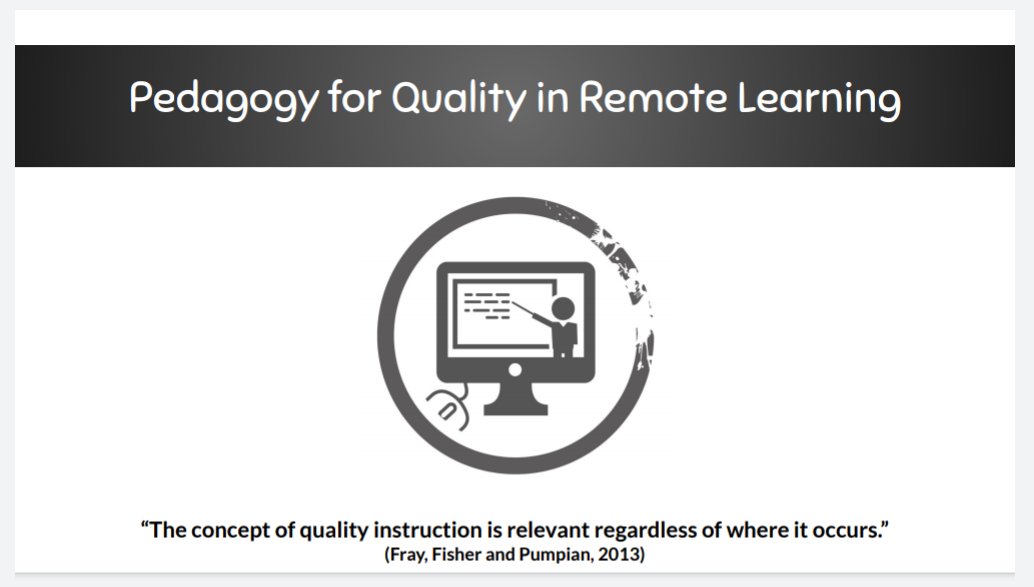Here are my musings on the & #39;remote& #39; aspect of #blendedlearning so far. No original thoughts here, just of a synthesis of snippets from research and blogs that I have read. Links to key readings included. I& #39;ve tried to highlight some helpful adaptations teachers can make...
...to exploit what technology has to offer when planning for asynchronous or synchronous lessons.
Big thanks to ideas included from: @RobDav1es, @BarriMoc, @MrsDJIandS, @MrWiseCHS, @ImpactWales and @smanfarr. Your insights and suggestions have really helped.
Big thanks to ideas included from: @RobDav1es, @BarriMoc, @MrsDJIandS, @MrWiseCHS, @ImpactWales and @smanfarr. Your insights and suggestions have really helped.
Establishing purpose.
We must ensure that pupils do not get too caught up in what they are doing digitally, so that they lose sight of what they are learning.
We must ensure that pupils do not get too caught up in what they are doing digitally, so that they lose sight of what they are learning.
Attention.
With competing demands on pupils& #39; attention only amplified online and at home, we must try to skilfully direct pupils& #39; attention at every opportunity so that they fully attend to learning.
With competing demands on pupils& #39; attention only amplified online and at home, we must try to skilfully direct pupils& #39; attention at every opportunity so that they fully attend to learning.
Cognitive Load.
Following on from that, it& #39;s helpful for remote learning to be planned with managing pupils& #39; cognitive load in mind. Reducing the burden on pupils& #39; working memories will, ultimately, help to improve remote learning.
Following on from that, it& #39;s helpful for remote learning to be planned with managing pupils& #39; cognitive load in mind. Reducing the burden on pupils& #39; working memories will, ultimately, help to improve remote learning.
Explanations.
Explanations are central to learning. Effective explanations within remote contexts require careful consideration and preparation, including ensuring pupils retrieve and build upon knowledge by connecting new ideas to old. Teachers& #39; expertise in content is key.
Explanations are central to learning. Effective explanations within remote contexts require careful consideration and preparation, including ensuring pupils retrieve and build upon knowledge by connecting new ideas to old. Teachers& #39; expertise in content is key.
Modelling.
Examples bring explanations and knowledge/skills to be learnt to life. They make the abstract (learning goals) concrete and achievable. We need to capitalise on opportunities to model not only approaches and responses, but expert disciplinary thinking.
Examples bring explanations and knowledge/skills to be learnt to life. They make the abstract (learning goals) concrete and achievable. We need to capitalise on opportunities to model not only approaches and responses, but expert disciplinary thinking.
Motivation.
We often hear: pupils who are motivated learn more. Let& #39;s change how we think about motivation. Pupils who experience success in learning will be motivated to learn. We need to incorporate plenty of opportunities for pupils to rehearse success, especially remotely.
We often hear: pupils who are motivated learn more. Let& #39;s change how we think about motivation. Pupils who experience success in learning will be motivated to learn. We need to incorporate plenty of opportunities for pupils to rehearse success, especially remotely.
Link to full summary here. Use or adapt as you wish. I& #39;ve tried to include all of the references to blogs and readings I& #39;ve used. Some ideas have been taken from my last thread, though, so are not referenced as such. https://www.dropbox.com/s/docyzgjwxctckcc/Pedagogy%20for%20Quality%20in%20Remote%20Learning.pptx?dl=0">https://www.dropbox.com/s/docyzgj...
Would love feedback from anyone able to offer additional suggestions. What would you add? What would you take away? How are you using the best of what technology has to offer to ensure high quality instruction, without overly complicating things?
Feedback is vital and clearly missing here. I think I& #39;ll start creating a separate resource on feedback in remote learning. I need way more space to collect my thoughts on this than one slide.
Any suggestions welcome.
Any suggestions welcome.

 Read on Twitter
Read on Twitter








